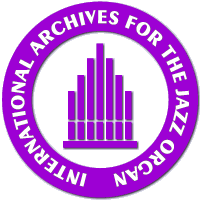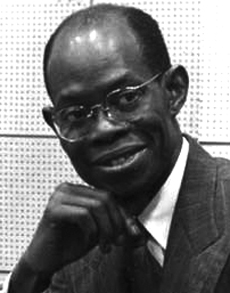
The Jazz Organ Scene
Fela Sowande

|
Fela Sowande
Olufela Obafunmilayo "Fela" Sowande (*1905 in Abeokuta, near Lagos) was a musician and
composer. Considered the father of modern Nigerian art music, Fela is perhaps the most
internationally known African composer of works in the European "classical" idiom. As
a child he sang in the Choir of the Cathedral Church of Christ. He studied at the C.M.S.
Grammar School and at King's College, Lagos. The influence of his father and Dr T. K.
Ekundayo Phillips (composer, organist and choirmaster) was an important factor in his
early years. Through Phillips, Sowande was first exposed to European church music like
Bach and Rheinberger. At that time, Sowande was a chorister and was introduced to new
Yoruba works being introduced into the churches. Under Phillips' tutelage, Sowande earned
the Fellowship Diploma (FRCO) from the Royal College of Organists. At that time, he was
also a bandleader, playing jazz and popular highlife music.
In 1934, Fela went to London to study European classical and popular music. In 1936, he was solo pianist in a performance of George Gershwin's Rhapsody in Blue. He also played as part of a pianist duo with Fats Waller, was theatre organist for the BBC, Choirmaster at Kingsway Hall and pianist in the 1936 production of Blackbirds. In 1939, he played the organ on recordings by popular singers Adelaide Hall and Vera Lynn. Later, he studied organ under Edmund Rubbra, George Oldroyd, and George Cunningham and became a Fellow of the Royal College of Organists in 1943, winning the Limpus, Harding and Read Prizes. He obtained a Bachelor of Music degree at the University of London and became a Fellow of Trinity College of Music. During the Second World War, he worked as musical advisor for the Colonial Film Unit of the Ministry of Information mainly providing background music for educational films, and lectured on music for the BBC Africa Service. From 1945 until 1952, he was organist and choirmaster at the West London Mission of the Methodist Church. During this time, he also became known as a dance pianist, bandleader, and Hammond organist, playing popular tunes of the day. Fela went back to Nigeria to scholarly work with the Nigerian Broadcasting Corporation and later the University of Ibadan. In 1952 Sowande became musical director of the Nigerian Broadcasting Service; in 1955 he was appointed MBE (Member of the Order of the British Empire) in the 1955 Queen's Birthday Honours for this work. In 1962 he travelled to the United States on a Rockefeller Foundation fellowship. In 1968, he moved to Howard University in Washington, D.C., then to the University of Pittsburgh. Western and African ideas prevail in his music, which included organ works such as Yorùbá Lament, Obangiji, Kyrie, Gloria, Jesu Olugbala, and Oba Aba Ke Pe. Most of these show a strong influence from Anglican Church music, combined with Yoruba pentatonic melodies, and would have appealed to members of the West London Mission of African descent. His orchestral works include Six Sketches for Full Orchestra, a Folk Symphony, and African Suite for string orchestra, and show African rhythmic and harmonic characteristics. The final movement of African Suite became known to Canadian audiences as the theme of the popular CBC music programme Gilmour's Albums, and is now a Canadian orchestral standard. In the last years of his life Fela taught in the Department of Pan-African Studies at Kent State University, and lived in nearby Ravenna, Ohio. In addition to his position as a professor, Fela also held the chieftaincy title of the Bariyo of Lagos. He died in 1987. from Wikipedia |
| contact: | |
| homepage: |
|
Softly, Softly Decca SKL 4124 released 1961 reissued 2016 as Father Of Nigerian Art Music on Mach60 Music |
Fela Sowande, Hammond organ Syd Jacobson, guitar Derek New, piano Ivor Rich, bass Reg Richmond, bass Hugh Lombard, drums |
|
The Adelaide Hall Collection 1927-60 Acrobat ADDCD3087 2 compilation |
Adelaide Hall, vocals Len Beadle, director Duke Ellington & His Orchestra John Ellsworth's Orchestra Lew Leslie's "Blackbirds" Orchestra Ray Martin & His Orchestra Mills Blue Rhythm Band Saville Theatre Orchestra Wally Stott & His Orchestra Jay Wilbur, conductor Kai Ewans, alto sax, clarinet Bubber Miley, trumpet Jabbo Smith, trumpet Francis Carter, piano Fela Sowande, Hammond organ Art Tatum, piano Joe Turner, piano Fats Waller, Hammond organ Al Craig, drums Willy Lewis, drums |
|
At The Hammond Organ • Quiet Rhythm The Digital Gramophone compilation |
Fela Sowande, Hammond organ |

|
n/a |
| n/a |
|
You can watch the video on the YouTube site by clicking on the corresponding picture. For more videos search YouTube |
|

|

|
Back
If you don't see the left hand menu,
please go back to the homepage.
Back to the homepage